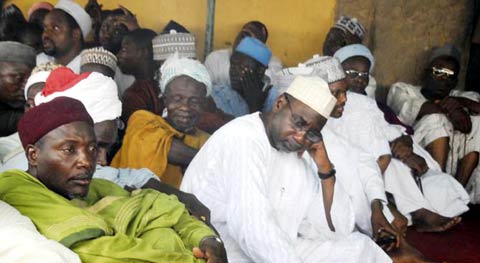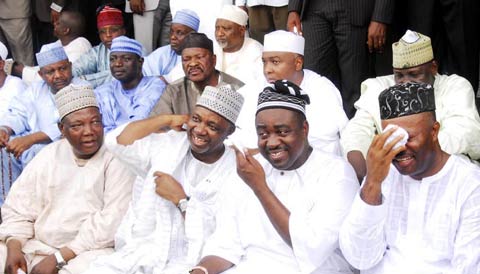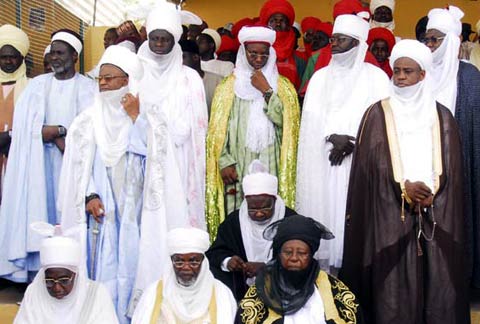The Governor of Central Bank of Nigeria, Sanusi Lamido Sanusi, yesterday in Kaduna blamed the current leaders in the North for the under-development of the region and their inability to sustain the legacies of the late Premier of the region, Ahmadu Bello.
Mr Sanusi, in a paper titled "Mobilizing Capital for the Economic Transformation of Northern Nigeria", which he delivered at the maiden Northern Economic Summit held in Kaduna, said recurring crises in Jos, Maiduguri and some other parts of the region were a result of the high poverty level caused by poor leadership.
The summit, which has as its theme, "An Agenda for Economic and Social Transformation of the North", was attended by only the host governor, Patrick Yakowa. The other 18 northern governors were absent at the event.
President Goodluck Jonathan; his vice, Namadi Sambo and a former head of state, Yakubu Gowon were, however, in attendance.
"How many people have taken statistics of collapsed industries in the North? It is because of government's negligence to provide power that led to the closure of these industries," Mr Sanusi said.
"If there are right economic policies, every part of this nation will benefit. Agriculture is 42 percent of the country's GDP and the North accounts for a greater percentage of the agric products, yet the North is very poor and backward because of lack of good agricultural policies."
Nigeria's number one banker, who said the economic problem of the North cannot be removed from the problem facing the country, explained that Nigeria suffers from the same resource curse that afflicts other countries that are endowed with natural resources.
Past glory
Mr. Sanusi advised Northern political leaders not to continue to give tribute to late Ahmadu Bello who, during his time, was able to give to the people the needed basic infrastructure. He said they should rather find ways to address poverty and infrastructure problems facing the region.
Mr Sanusi said the key to addressing the high poverty rate in the north is fixing the agricultural value chain so that real farmers can have access to finance and the necessary policies and infrastructure. He stated that the summit will be an exercise in futility if it does not address the problems of the ordinary people on the street.
"The immediate post-independence leaders in the north articulated a blueprint for industrial development akin to the model of the South Asian economies. The outcome of that vision was evident with the emergence of industrial, commercial and manufacturing concerns that were once the pride of the North," he said.
"The thriving textile industries, groundnut pyramids and other numerous business concerns that provided a means of livelihood for the thousands of families are now only mentioned in the past tense."
He said if subsequent leaders in the region fail to build on the foundation laid by their predecessors, they could have sustained those legacies, pointing that rather than creating the enabling environment for the enormous potentials of the region to be effectively harnessed, leadership in the region has largely fallen short of the standard set by the post-independence leadership.
"This has resulted in pervasive poverty, poor infrastructure base, reliance on statutory allocations, general under-development and insecurity occasioned by incessant religious or ethnic unrest", the CBN Governor stated.
Mr Sanusi, who explained that about $1billion was spent only on importation of rice last year, also stressed the need for the federal government to remove subsidy on imported rice and fertilizer, which he said can be manufactured locally as a way of creating employment in the country.
He said the same people benefiting from the importation are the ones frustrating the manufacturing of the products locally.
Mr Sambo described the summit as timely because it came at a transitional period to another democratic dispensation. He emphasized that for the summit to be termed successful, it must address the areas of high poverty rate, decayed infrastructure, education backwardness and under-utilization of the potentials of the North in Agriculture.
While calling on all northern leaders to improve on the existing infrastructure built by past leaders, such as the Ahmadu Bello University, Unity Bank, New Nigerian Newspapers and Kaduna Polytechnic, Mr Sambo expressed the determination of the Goodluck Jonathan's administration to address the problems of power, education and revival of moribund industries across the country.
Build on your strengths
The Chairman of the occasion, Yakubu Gowon, said the summit was to articulate strategies to transform the economy of the states in the North, adding that it would also produce practical and implementable economic charter for all the states in the region.
He recalled with nostalgia the disappearance of high quality groundnut and cotton pyramids in Kano, Gusau, Katsina and other places, as well as the textile industry in Kaduna, Kano and the high quality tin ingots from Jos.
"Where are they today? We must ask questions, where do we want to be today and tomorrow, and how do we want to get there at least by 2020? These are some of the questions we must address at this summit," Mr Gowon said.
Speaker of the House of Representatives, Dimeji Bankole while observing that it took the region a long time to organise such a summit, said the development of the region will go a long way in developing the entire country.



